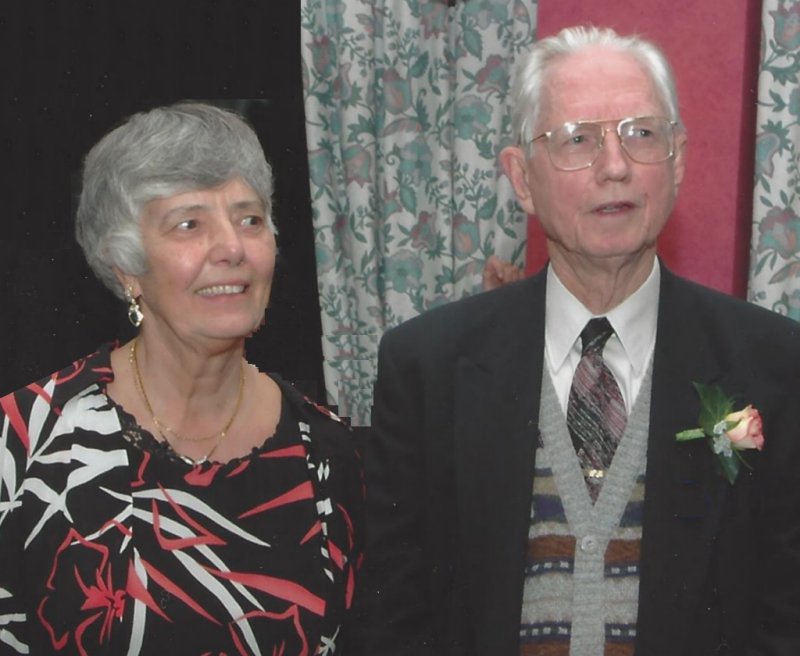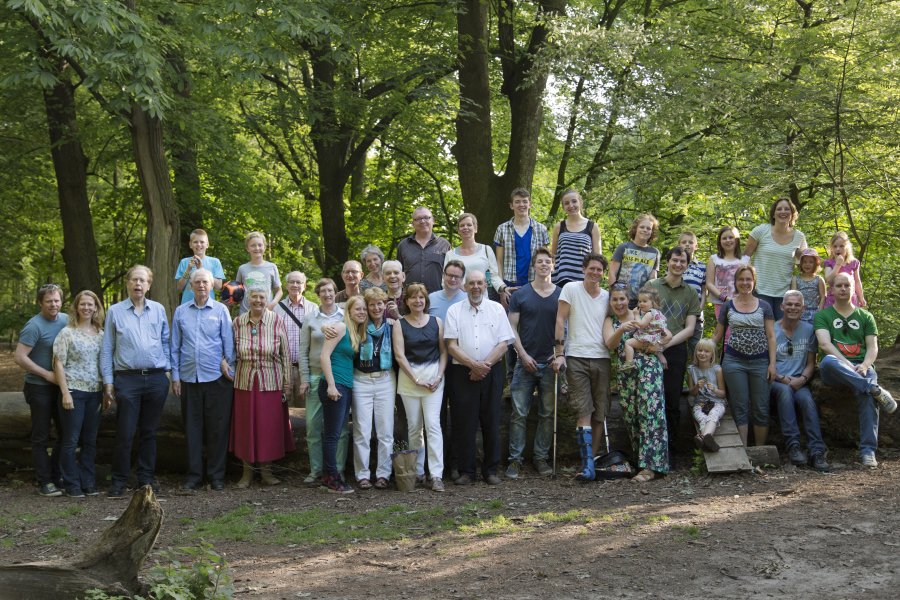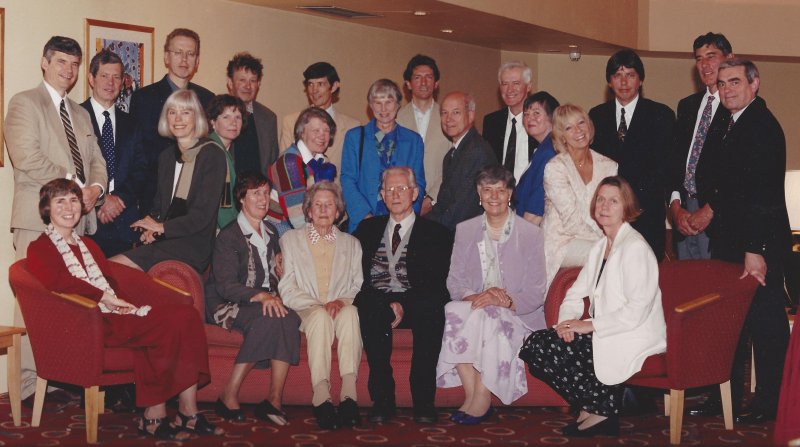My marriage to Jackie Clackson
In the course of the years Jackie and I had come to know each other extremely well. Even when we ministered in India, our paths had crossed a number of times. Founding Housetop Centre together, living in the same house and shouldering joint responsibility for some many diverse apostolic projects had brought us very close. We found that we both shared the same vision and could produce results as a well-knit team. But we had also cemented on a personal level. We respected and appreciated and, yes I will say it: begun to love each other.
So when, on the 21 February 2000, I received from Rome the indult that released me from the obligation of celibacy, the result was inevitable. We decided to get married. In April of that year we married in a simple Church ceremony in the Netherlands. We also sealed the marriage civilly in the county offices in High Wycombe under which we resorted at the time.

Jackie and I at a celebration in the Netherlands
I realised that my marriage, however much sanctioned by the official Church, might still upset vulnerable people. So I spent months explaining my reasons to all the circles of friends and associates with whom I was in touch.
Process of intense communication
I wrote a great number of letters: to my former Mill Hill colleagues, to sponsors and supporters of our Housetop Communication Centre, to reform groups, to family members on the Wijngaards and Clackson sides, to people I had worked with in India. These letters all had personal introductions, but substantially they carried the same information.
I will print here the central portion of the letter I sent individually to all bishops and religious superiors in Andhra Pradesh:
“You may wonder how my marriage relates to the women priests’ issue. When, on 17 September 1998, I wrote to the Holy Father to inform him of my decision to resign from my active priestly ministry in protest against Ad Tuendam Fidem, I stated explicitly that my resignation was not a question of priestly celibacy. I simply wanted to be officially released from my priestly duties on account of a serious conflict of conscience regarding the ordination of women, since the Roman documents were saying that those who believe in the ordination of women ‘are no longer in communion with the Church’. My letter to Rome was followed up by personal visits to the relevant Vatican departments by Mill Hill’s Procurator General in Rome, and on one occasion, even by my Superior General. The consistent answer we received from Rome was that it acknowledges only the standard procedure for laicisation. When I was handed the form, I found out that the whole process focuses on celibacy and that, under oath, I would be required to reveal all relevant facts in this matter – and here things became really interesting.
During my priestly work in India starting in the 1960s, I soon found out that traditional spirituality at home and claustrophobic teaching in the seminary had prevented me from gaining sufficient knowledge to undertake the obligation of celibacy. My spiritual director in Bangalore, who was also a professor of moral theology, told me that I could legitimately apply for dispensation. I decided not to act on this advice, because I knew I had a genuine priestly vocation and I felt responsible for the people entrusted to my care.
Although similar problems existed in India, and may still exist in some areas, many people in India did not understand the crisis about celibacy that affected European missionaries at the time. You will remember how this made such good priests as Fathers Eddie Bennett and John Murphy leave their priestly ministry. The reason was that during our preparation for the priesthood the question of celibacy had not received adequate attention. This was not due to a deliberate policy of deception, but resulted from a repression of discussions on sex, an exclusion of normal female company, a wrong emphasis on celibacy as a necessary ingredient of the priestly ministry (which it is not), a general climate of religious enthusiasm which, however good in itself, lured even those without a calling to the celibate state into accepting it without appreciating the consequences.
I felt trapped at the time but I decided that my priestly ministry, which I knew to be a genuine vocation, should come first in the circumstances. The deeper cause of the conflict lies, of course, in the Church’s antiquated insistence on imposing celibacy as a necessary condition for the priesthood. While, no doubt, arising from admirable monastic ideals, this policy is bound to force well-meaning candidates with a true priestly vocation, into a celibate style of life to which they are not called and in which they miss the love and support of a faithful companion of which they may have a natural, human need.
Anyway, to come back to the recent past. The process of ‘laicisation’ in 1998 to which I was subjected and in which I had to supply information under oath, brought all these facts to light. When the indult came, the Church officially released me from the duty of celibacy – which, it recognised, I should not have undertaken in the first place. So I did not see any further reason to deny what I have known for half a century: that I have both a priestly vocation and a calling to married life. Rome’s strange behaviour has, paradoxically, brought new freedom and joy into my life.
I would like my former students, colleagues and friends to know that neither my conflict with Rome in the matter of women priests, nor my final decision to marry stand in contradiction to the ideals of the priesthood which I have tried to present in my life and teaching. For God is Love, and the whole meaning of our priestly ministry is to serve God’s people in love.” John Wijngaards
Responses
Predictably some people responded negatively to the news of my marriage. They were mostly the same persons who had rejected my leaving the exercise of the priestly ministry in protest against women’s exclusion from ordination. Some of these took the trouble to reply to me and I could see that they were genuinely upset.
A Poor Clare Sister from a convent in North Wales wrote me a long letter in which she stated: “When you freely chose to be a priest, more than forty years ago, you freely committed yourself to the Lord in a life of celibacy . . . It is your word that made you what the Word called you to be: a priest. The dispensation of the Church has ‘freed’ you from the obligation of the clerical state. But it does not ‘free’ you from yourself. You still are what your word has made you – the word you gave to the Lord to accept celibacy. It is your integrity that is at stake.”
She got it wrong, of course. To begin with, I had accepted celibacy but only because it was a legal requirement for admission to the priesthood, not because it had been a religious ‘vow’. Secondly, because of the prevailing sexual repression, as I have explained above, my promise of celibacy had been invalid. As Thomas Aquinas explains, if the object of a promise is not properly understood, the promise is null and void. Thirdly, the Church had, after ascertaining all the facts, explicitly released me from the promise of celibacy.
However, I am happy to say, the vast majority of my friends and contacts responded positively. This applied to family, my Mill Hill colleagues, bishops and religious sisters in India, reform groups in many parts of the world. Marampudi Joji, one of my former students and Archbishop of Hyderabad at the time, came to visit me in London soon afterwards. The Superior General of a Congregation of Teaching Brothers wrote to me from the Netherlands – I translate his words from the original Dutch: “First of all, my congratulations to you and Jacqueline! May you enjoy peace and fulfilment notwithstanding all challenges that may await you . . . I have always appreciated your authenticity and directness. Your frank disclosure of all the facts impress me. Our Founder, when confronted with the complex situations in life – whether church-political or of a personal nature – , often spoke of ‘loving guidance by Providence’. I hope that you may experience that loving guidance, whatever opposition you may need to face.”
Our wedding celebrations
Since most of my family live in the Netherlands, we organised a huge party there for my brothers and sisters-in-law with their children and grandchildren. It involved a day out, with the whole clan, in a nature reserve near Arnhem known as ‘Park Hoge Veluwe’. Then a sumptuous meal in a restaurant at the entrance of the reserve.

The Wijngaards clan – photograph taken some years later
In England we also organised a huge feast which brought all the Clacksons together in the Swallow Hotel in Waltham Abbey on the 27th of May. Little did we know at the time that it would be the last family occasion for some of the family to be present. Jackie’s Aunt Bertha was to die soon afterwards. And Jackie’s cousin Adam was to tragically lose his life three months later while sailing his yacht on the North Sea.

The Clacksons – the eldest, Aunt Bertha, sitting to the right of me. Adam standing second from left in the back row.
Next Tribute to Jackie when she died
See a photo gallery of Jackie and me here.
THE STORY OF MY LIFE
- » FOREWORD
- » Part One. LEARNING TO SURVIVE
- » origins
- » into gaping jaws
- » from the pincers of death
- » my father
- » my mother
- » my rules for survival
- » Part Two. SUBMIT TO CLERICAL DOGMA — OR THINK FOR MYSELF?
- » seeking love
- » learning to think
- » what kind of priest?
- » training for battle
- » clash of minds
- » lessons on the way to India
- » Part Three (1). INDIA - building 'church'
- » St John's Seminary Hyderabad
- » Andhra Pradesh
- » Jyotirmai – spreading light
- » Indian Liturgy
- » Sisters' Formation in Jeevan Jyothi
- » Helping the poor
- » Part Three (2). INDIA – creating media
- » Amruthavani
- » Background to the Gospels
- » Storytelling
- » Bible translation
- » Film on Christ: Karunamayudu
- » The illustrated life of Christ
- » Part Three (3). INDIA - redeeming 'body'
- » spotting the octopus
- » the challenge
- » screwed up sex guru
- » finding God in a partner?
- » my code for sex and love
- » Part Four. MILL HILL SOCIETY
- » My job at Mill Hill
- » The future of missionary societies
- » Recruitment and Formation
- » Returned Missionaries
- » Brothers and Associates
- » Part Five. HOUSETOP LONDON
- » Planning my work
- » Teaching teaching
- » Pakistan
- » Biblical Spirituality
- » Searching God in our modern world
- » ARK2 Christian Television
- » Part Five (2) New Religious Movements
- » Sects & Cults
- » Wisdom from the East?
- » Masters of Deception
- » Part Five (3). VIDEO COURSES
- » Faith formation through video
- » Our Spirituality Courses
- » Walking on Water
- » My Galilee My People
- » Together in My Name
- » I Have No Favourites
- » How to Make Sense of God
- » Part Six (1). RESIGNATION
- » Publicity
- » Preamble
- » Reaction in India
- » Mill Hill responses
- » The Vatican
- » Part 6 (2). JACKIE
- » childhood
- » youth and studies
- » finding God
- » Mission in India
- » Housetop apostolate
- » poetry
- » our marriage
